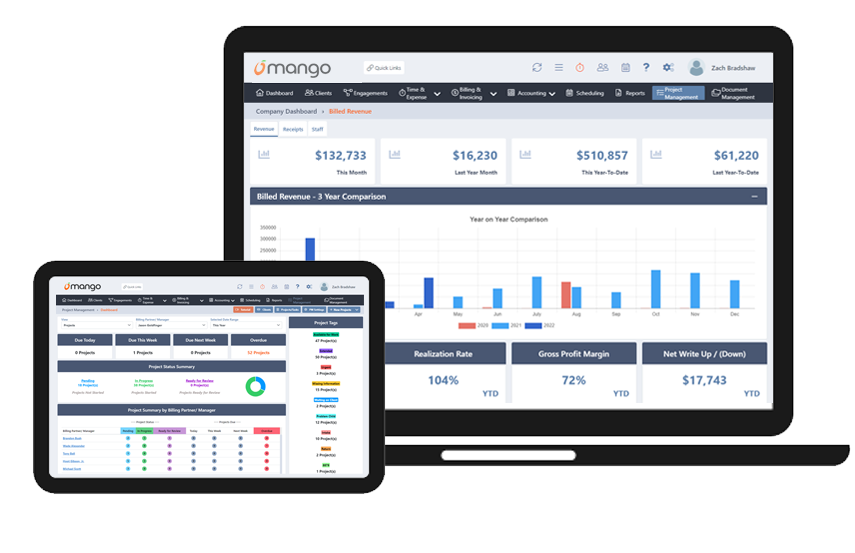An Essential Guide to Pricing Client Accounting Services

Client Accounting Services (CAS) is quickly becoming a core revenue driver for accounting firms across the globe. According to the 2023 Accounting Today report, 50% of firms now offer these services and over 30% of annual revenue is attributed to CAS for more than a quarter of them.
As AI takes over more of the routine tasks, accountants are focusing on higher-value services like Client Accounting Services (CAS), which range from everyday bookkeeping to strategic financial advice.
The tricky part? Pricing accounting services so they truly reflect their worth without hurting profits or pushing clients away. Price too low, and you risk underappreciating your expertise. Set it too high, and clients might start looking elsewhere.
Understanding the key factors that affect pricing is crucial for creating a profitable and sustainable CAS offering.
What Really Drives the Pricing of CAS?
CPA firm billing rates, especially for Client Accounting Services (CAS), are far from a straightforward task. It's influenced by several moving parts, all of which demand careful consideration.
Here are the top factors that should shape your accounting services pricing strategy:
Service Complexity and Scope
The range of services you offer can really affect your pricing. Are you just doing basic bookkeeping, or are you diving into full financial strategy sessions?
The more complex the advisory roles, the more time and expertise you'll need, so your prices should reflect that.
Key considerations:
- Is the client looking for ongoing support or just occasional help?
- Are you providing strategic insights, or is it mostly transactional work?
Firm Expertise and Niche Knowledge
Experience counts. Firms with a solid track record or those specializing in areas like real estate accounting or non-profit audits can charge higher fees.
Clients are often willing to pay more for tailored expertise, especially in industries with tricky financial regulations.
- How deep is your firm’s knowledge in specific industries?
- Do you have any certifications or specialized training that set you apart?
Market Demand and Client Size
Your local market dynamics also play a role. If you’re serving larger clients with more complex needs, they’ll expect a higher level of service, so your pricing should match.
On the other hand, smaller clients might not need the full range of services, giving you room for flexible pricing options.
- Are your clients in industries with strict compliance requirements?
- What are your competitors charging, and how does your pricing stack up?
Smart Strategies for Pricing Client Accounting Services
When it comes to pricing accounting services, two popular models stand out: value-based pricing and fixed pricing. Each has its own pros and cons, making them suitable for different situations.
Value-Based Pricing
Instead of charging clients based on how many hours you work, you charge them based on the value your services bring. In short, you align your fees with the real benefits clients get from working with you.
For example, if your financial advice helps a client save $20,000 in taxes, it makes sense to charge a fee that reflects that impact—maybe even a percentage of those savings. This way, clients can clearly see how your services directly contribute to their financial well-being.
Pros:
- Clients See the Value: When clients recognize significant benefits, they’re often willing to pay more. If they believe your expertise will save them money or boost their revenue, they’ll view your fee as an investment rather than just another expense.
- Grow Together: As you continue to deliver value and build strong relationships, your fees can grow alongside your clients’ success. For instance, if you help a small business expand and increase profits, you can adjust your fees to match their evolving needs.
Cons:
- Measuring Value Isn’t Always Easy: It can be tricky to quantify the exact value you provide, especially for services like long-term planning where results take time to show.
- Potential for Confusion: Since pricing is tied to perceived value, clients might feel uncertain about costs if you don’t communicate clearly from the get-go. Setting expectations upfront is key.
Fixed Pricing
This is where you charge a flat fee for specific services—think monthly bookkeeping or tax prep. It’s straightforward and easy for clients to understand.
Pros:
- Budget-Friendly: Clients love knowing exactly what they’ll pay each month. For instance, if they know they’ll pay $500 for bookkeeping, it makes budgeting a lot simpler.
- Less Admin Hassle: With fixed fees, you skip the back-and-forth of hourly billing. This lets you focus on providing great service without stressing over tracking every minute.
Cons:
- Limited Flexibility: Fixed pricing might not adapt well when the client needs change. If a client’s situation evolves and requires more work than initially agreed upon, it can lead to scope creep or unbilled extra work.
- Risk of Underpricing: If a client’s needs grow or get more complex, you could find yourself underpricing your services. For example, if you start with a flat fee for basic tax prep but later realize they need extensive consulting too, you might end up feeling short changed for all the extra work.
How to Make Your CAS Pricing Work for You
Once you’ve nailed down your accounting services fees, it's time to make sure they’re implemented smoothly. Here are some tips to steer clear of common pitfalls:
Communicate Pricing Transparency
Be upfront about your fees and any potential extra charges. This builds trust and helps clients feel confident in their choices.
- Break Down Services: Instead of just listing prices, take the time to explain the value of each service you offer. This helps clients understand what they’re getting and why it’s worth it.
- Discuss Additional Costs: If there are extra charges for additional services, let clients know upfront. This way, there are no surprises later on.
Prevent Scope Creep
Scope creep can be a real headache for accounting firms offering Client Accounting Services (CAS). It often sneaks in when project terms aren’t clearly defined, leading to unbilled work and stretched resources.
- Engagement Letters as Protection: Use engagement letters to clearly outline what’s included in your services. This helps set boundaries and manage client expectations.
- Regular Check-ins: Keep the lines of communication open throughout the project, so everyone stays aligned on goals and can address any changes before they escalate.
Stop Scope Creep in Its Tracks
Mango Practice can help you prevent scope creep and deliver exceptional CAS. Our platform streamlines project management, enhances communication, and automates workflows, ensuring your projects stay on track and within budget.
Leverage Technology
Implementing CAS pricing is a breeze with tools like Mango Practice Management.
- Automate Engagement Letters: Save time and keep everything consistent by automating your engagement letter creation. With Mango, you can quickly generate engagement letters that clearly outline your services, costs, and responsibilities.
- Client-Friendly Access: With our cloud-based system, clients can quickly access, review, and sign letters online. This speeds up onboarding and cuts down on all that paperwork.
Take Charge of Your CAS Pricing with Confidence
Pricing Client Accounting Services (CAS) doesn’t have to be overwhelming. With the right strategies, you can set rates that reflect your expertise and provide real value to clients. By focusing on transparency, clear communication, and setting proper expectations, your firm can build stronger client relationships and avoid common pitfalls like scope creep.
Mango Practice Management is built to elevate your firm. With automated engagement letters, seamless client collaboration, and powerful tools to streamline growth, you can focus on delivering results while we handle the heavy lifting.
Ready to transform your firm? Discover how Mango can improve your practice by driving efficiency and boosting profitability.
Take Your CAS to the Next Level

Mango Practice Management has everything you need to make pricing easier, keep communication flowing, and amp up your firm’s efficiency.
Latest Posts
Proactive Fraud Prevention: Where AI Fits for Forensic Accountants
Fraud rarely announces itself loudly. It hides in normal-looking transactions, familiar vendors,…
Non-Profit Accounting Software Tips: Get More from Your System
Is your finance team stitching together reports from spreadsheets? Use these non-profit accounting software tips to strengthen internal controls, automate fund tracking, and deliver clear financial stories to your board.
Audit Accounting Firm Software: Client Engagement, Cloud Integration, and Workflow Automation
Audit work runs on details. Modern audit accounting firm software helps firms centralize client data, improve cloud collaboration, and automate repetitive workflows for a cleaner engagement and a better client experience.
Conquer the 2026 Tax Season: Strategies for Accountants to Stay Ahead
Tax season for accountants is the busiest time of the year. While…
From Bookkeeping to Insights: Choosing the Right Managerial Accounting Platform as Your Firm Grows
Growing firms eventually hit a ceiling with traditional bookkeeping tools. Learn how to choose the right managerial accounting software or practice management platform to turn historical data into forward-looking growth insights.




